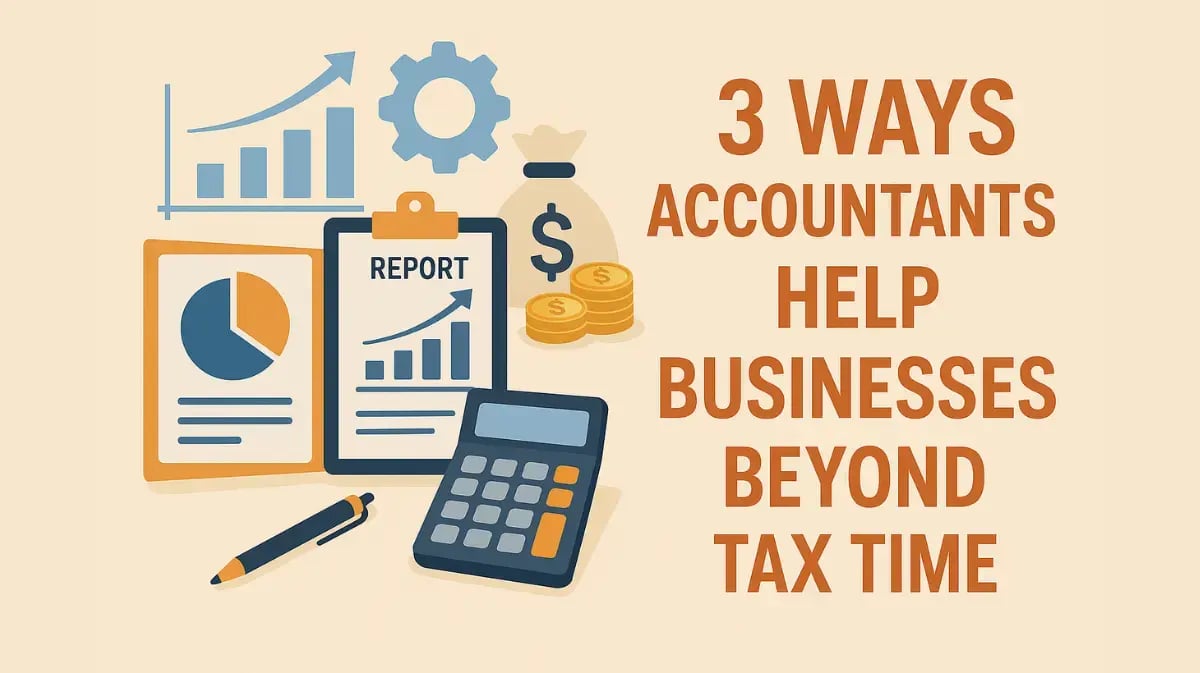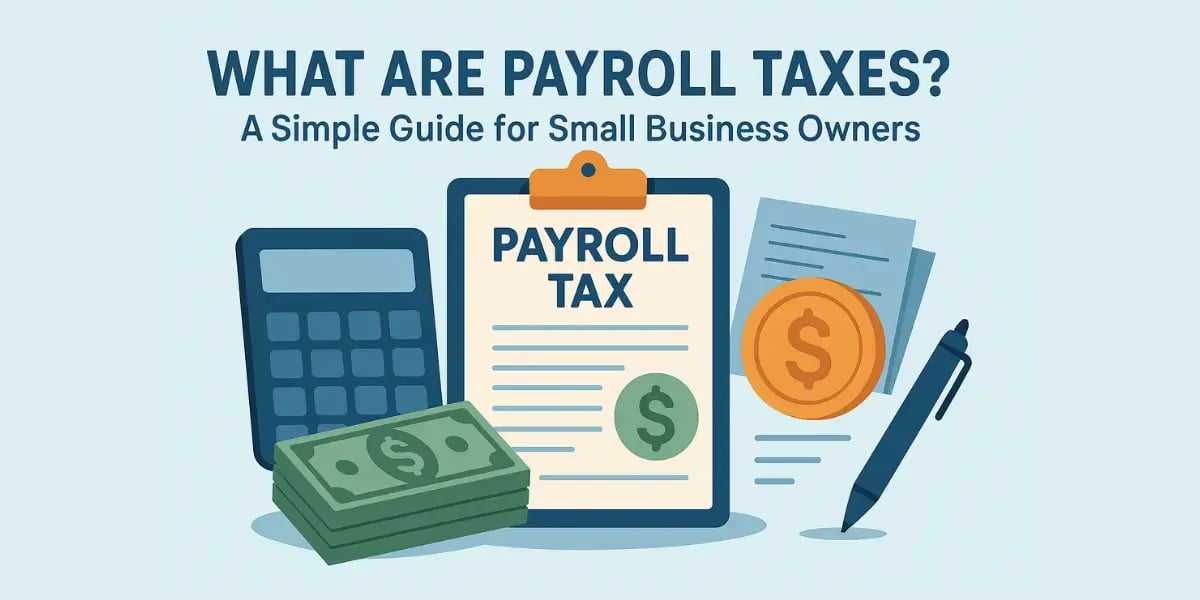3 Ways Accountants Help Small Businesses Beyond Tax Time
July 8th, 2025
6 min read

If the only time you hear from your accountant is in March or April, you might be missing out on the best part of the relationship.
A good accountant isn’t just a “tax expert” — they’re a year-round business ally.
For small business owners, especially those juggling tight margins, payroll, and ever-changing compliance rules, having consistent financial support can be the difference between thriving and just surviving.
At TMA Accounting, we believe owning a small business shouldn't be so complex. That’s why, for over 25 years, we’ve helped our clients manage more than just tax filings.
Below, we’ll walk you through three ways accountants support your business all year round, giving you more clarity, confidence, and control.
1. Ongoing Financial Reporting and Analysis
If you don’t know your numbers, you don’t really know your business.
Too many small business owners make decisions based on gut feelings or bank account balances. That might work for a while, but over time, it leads to missed opportunities, hidden problems, and cash flow surprises.
That’s where ongoing financial reporting and analysis make all the difference.
What Is Financial Reporting and Analysis?
Financial reporting involves creating regular summaries of your business’s financial health. These reports are essential tools that help you see how your business is really performing, not just how it feels like it’s performing.
Typical reports include:
- Profit and Loss (P&L) statements – Show your revenue, expenses, and net income over time.
- Balance sheets – Summarize your assets, liabilities, and equity at a specific point in time.
A good accountant doesn’t just send over the reports and call it a day. They should walk you through what the numbers mean, highlight patterns or red flags, and help you connect the dots between your day-to-day operations and your bottom line.
Whether you're considering a new hire, exploring financing options, or seeking to improve profitability, this level of insight is essential.
Why Does Your Business Need This?
Let’s face it: tax time only gives you a rearview mirror look at your business. It tells you where you were, but not where you’re headed — and by the time you’re filing last year’s returns, it’s often too late to fix mistakes or capitalize on missed opportunities.
That’s why ongoing financial reporting is so important. It provides a current, forward-looking view of your business.
With regular updates, you can clearly see:
- Whether you’re turning a consistent profit.
- Where your cash is going each month.
- Which parts of your business are performing best (and which need attention).
This type of visibility helps you:
- Spot trends early, like rising costs and declining sales.
- Make better-informed decisions.
- Catch small issues before they become expensive problems.
In short, regular financial reporting helps you stay in control. Instead of reacting to problems after the fact, you can run your business with foresight, confidence, and purpose.
How An Accountant Helps You Succeed
When you have timely, easy-to-understand financial data, everything about running your business gets a little clearer and a lot less stressful.
You’re no longer making guesses based on your gut or your bank balance. Instead:
- You stop guessing and start managing with intention.
- You can confidently decide whether it’s time to hire, raise prices, or scale back.
- You’ll be ready to meet with a lender or investor, and actually know what to say.
Clean financial data leads to good decisions. And good decisions lead to a stronger, more successful business.
2. Bookkeeping and Compliance Management
If you’ve ever felt buried in receipts or stressed about missing a tax deadline, you’re not alone.
Many small business owners underestimate the amount of time and energy required to keep records organized. But messy books and missed filings don’t just create headaches — they can lead to penalties, audits, and serious disruptions.
That’s why bookkeeping and compliance management aren’t just back-office chores — they’re essential building blocks for a stable and successful business.
What Is Bookkeeping and Compliance Management?
Bookkeeping is more than just logging receipts or entering numbers into QuickBooks. It’s about creating a clean, consistent record of every transaction your business makes — revenue, expenses, invoices, bills, and more.
Compliance management adds another layer: making sure your business stays up-to-date with local, state, and federal regulations. That includes:
- Sales tax filings
- Payroll compliance
- Property tax returns
- 1099 filings and more
Together, these two functions create the financial infrastructure of your business. Without them, everything else — from your reports to your tax returns — starts to unravel.
A reliable accountant should make sure these tasks are done, so you’re not left scrambling when deadlines roll around.
Impact on Your Business
Let’s say you’re late filing a state sales tax return. That could trigger penalties, audits, or worse, especially if it becomes a pattern.
Here’s what poor bookkeeping can lead to:
- Missed tax deadlines
- Payroll issues
- Inaccurate financials
- Lost deductions
- Legal and financial headaches
Clean records and timely compliance don’t just keep the IRS off your back. They make your business stronger and easier to manage.
How Bookkeeping and Compliance Help You
When you let a trusted accountant take care of your bookkeeping and compliance, you’re freeing yourself from a major source of stress — and creating more space to focus on running and growing your business.
With professional support, you can:
- Spend less time buried in paperwork
- Avoid penalties and late fees
- Have up-to-date records when it’s time for loans, grants, or investors
Sound bookkeeping and compliance management protect your business from risk, providing you with the clarity and breathing room to make informed decisions and move forward with confidence.
3. Year-Round Business Advice and Tax Help
Business decisions don’t just affect your bottom line — they affect your taxes, too.
From hiring employees to purchasing equipment or adjusting your pricing, nearly every move you make has a financial impact. And when those decisions are made in isolation — without considering their tax consequences — you could be setting yourself up for a painful surprise come tax time.
That’s why having year-round access to your accountant is so valuable. A good accountant shouldn’t just show up when it’s time to file. They should be helping you understand how today’s choices affect tomorrow’s taxes — and overall profitability.
What Is Business Advice and Tax Help?
This is the part of accounting that many business owners overlook — and often the one they benefit from the most: guidance and tax insight all year long.
An accountant serves as a trusted advisor who helps you:
- Analyze your numbers
- Set realistic goals
- Plan for growth
- Identify tax-smart opportunities
Think of it like having a financial GPS. Instead of waiting until tax time to find out you’re off course, you’re getting help and recalibration all along the way.
With this kind of support, you can move forward with clarity, knowing your decisions are aligned with your business goals.
Why Your Business Needs This
Most small business owners are brilliant at what they do, whether it’s building homes, running a clinic, or operating a restaurant. However, when it comes to major decisions, such as expanding to a new location, purchasing new equipment, hiring additional staff, or revising your pricing structures, you don’t want to rely solely on instinct.
This is where a proactive accountant can add real value. With the proper financial guidance, you can:
- Better prepare for seasonal changes or new expenses.
- Understand your break-even points.
- Explore tax-saving opportunities before the end of the year, rather than scrambling in the spring.
- Evaluate the financial impact of major decisions before committing.
Having this kind of insight allows you to act decisively and dodge decisions that might hurt your bottom line.
How Do These Help You?
When you have a trusted advisor to help you run the numbers and see the big picture:
- You reduce risk and increase confidence
- You stop making decisions based on stress or guesswork
- You build a stronger business foundation for the future
TMA Accounting brings the experience of working with hundreds of small businesses to each conversation. That means we know what works — and what doesn’t — in real-world situations.
Whether you’re planning to expand, pivot, or simply survive a tough season, your accountant should be one of your first calls.
You Might Have Outgrown Your Once-a-Year Accountant
Accounting isn’t just about filing taxes. It’s about helping small business owners navigate complexity, make better decisions, and build a more profitable and resilient business.
When you work with an accountant year-round, you get:
- Better visibility into your financial health
- Peace of mind that you’re staying compliant
- A trusted ally who understands your goals
If you're tired of only seeing your accountant during tax time or, worse, cleaning up a financial mess every year, it's time for a change.
Let TMA be a resource for your business.
We’ll help you stay ahead of your numbers, avoid compliance issues, and build a more organized business.
Schedule a free consultation today and learn how ongoing accounting services can support your success, not just in April, but every month of the year.
Blog Disclaimer: Nothing in this post constitutes legal, tax, or financial advice and is intended for informational and educational purposes only. This informational and educational material is not intended, and must not be taken, as legal, tax, or financial advice on any particular set of facts or circumstances or as recommendations that are suitable for any specific person. You need to contact a lawyer, accountant, or financial adviser licensed in your jurisdiction for advice on your specific questions, issues, and concerns. View our full Terms of Use here.























